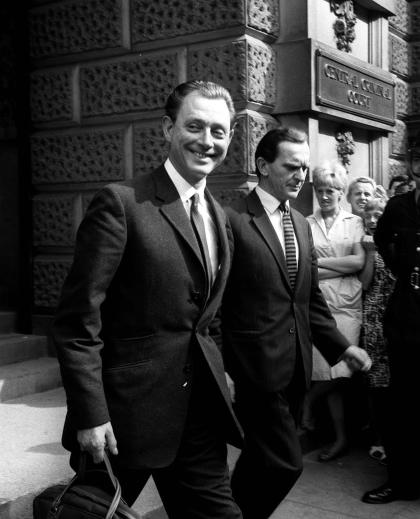On This Day: Profumo scandal rocks Westminster
It is half a century since John Profumo, Secretary of State for War, lied in the House of Commons about having an affair with the call girl Christine Keeler.

Britain's most sensational sex and security scandal is 50 years old on Friday.
It is half a century since John Profumo, Secretary of State for War, lied in the House of Commons about having an affair with the call girl Christine Keeler.
The denial resulted in the exposure of a searing story of sex, suicide, intrigue and espionage - and demolished Profumo's world of red-leather despatch boxes, scrambler telephones and the panoply of a Minister of the Crown.
Profumo was a rising star of the Tory Party, close to Prime Minister Harold Macmillan, a favoured visitor at Buckingham Palace, a war hero and the dashing husband of a famous film star.
Then, seven shots fired at a house in a quiet Marylebone mews by a jilted boyfriend of Christine Keeler triggered Britain's most notorious political sex scandal of modern times.
The Profumo affair convulsed Westminster for nearly six months.
Macmillan's Cabinet was shaken by Keeler's revelations that she had sex with both Profumo and Commander Eugene Ivanov, a handsome Russian intelligence officer and the Soviet assistant naval attache in London.
On March 22 1963, battered by parliamentary gossip, Profumo delivered a personal statement to MPs denying any "impropriety whatsoever" in his relationship with Keeler.

Prime Minister Macmillan and Cabinet colleagues took Profumo at his word, but opposition MPs and newspapers remained sceptical.
On June 4 1963, after a welter of rumour, accusation and denial that rocked the Government, Profumo, known as Jack, was forced to resign when osteopath and man-about-town Dr Stephen Ward was arrested and charged with living on immoral earnings.
It was Ward who in 1961 took Keeler to Lord Astor's country home at Cliveden, Berkshire, where Profumo first set eyes on the doe-eyed brunette climbing nude from the swimming pool.
She was 19 and he was 48, married to the beautiful Valerie Hobson, star of classic Ealing comedies such as Kind Hearts And Coronets.

Ms Hobson, who loyally stood by her husband throughout this terrible personal crisis, died aged 83 in November 1998.
Profumo entered the Commons at only 25, winning Kettering at a by-election in 1940, to become the youngest MP in the House.
He was handsome, smooth, slightly balding and highly attractive to women.
After the war he lost his seat, but got back into Parliament in 1950 as MP for Stratford-upon-Avon.
Two years later he was in government office, as Joint Parliamentary Secretary at the Ministry of Transport.
Ever ascending, Prime Minister Macmillan made him Secretary of State for War in July 1960 with a brief to boost Army recruitment following the end of conscription.
He made a success of it.
It appeared as if nothing could stand in the way of Profumo's ambition to be foreign secretary.
He was even tipped as a future prime minister.
Then he met Keeler.
Their affair was as brief as it was casual.
It might have ended without public knowledge, but for a bizarre set of circumstances.
Keeler was also sleeping with Ivanov, whom she met through Ward, and with a West Indian petty criminal called Johnny Edgecombe.
Ward, who had many Tory MPs among his patients, was alleged to be the central figure in a "top people's" vice ring.
The involvement of the Russian was seen as a potentially serious threat to national security.
Newspapers, to whom Keeler sold her story, held back from publishing details.
But gossip circulated in Westminster and Fleet Street, not only about the War Minister and Keeler, but linking other prominent Tory politicians with call-girls and sex orgies.

The affair became public by a grapevine of rumour that got considerably bigger all the time until the truth could be concealed no longer.
The story did not begin to break until the jealous Edgecombe went after Keeler and opened up with a revolver outside Ward's home where she was staying.
Police involvement revealed for the first time the seedy tale of prostitution, espionage and deceit.
The Profumo affair rocked the Tory establishment to the roots during the final months of the Macmillan administration, when he was sick and Labour - under its new leader Harold Wilson - was smelling blood.
The rumours surrounding the case, including one that a Conservative minister attended an orgy wearing only a maid's frilly apron and a mask, led to an inquiry by Lord Denning, the Master of the Rolls.
He found all the rumours to be untrue.
In the end the seediness of the Profumo affair proved fatal to 13 years of unbroken Tory rule.
Before the year was out, Mr Macmillan resigned as prime minister and was replaced by Sir Alec Douglas-Home, who lost the general election.
Profumo suffered scandal without reply.
The summer he fell, he made a vow of silence and never opened his mouth again to answer any criticism or misrepresentation, however unfair.
The only time he spoke of it was to his son David who produced the memoir Bringing The House Down.
Profumo served penance for parliamentary dishonour with more than 30 years of charity work among the poor in the East End of London.
Friends believe he more than made up for the ruin he brought on a brilliant political career.
In 1975 he came in from the cold with a CBE for his work at Toynbee Hall, the East End settlement where he began the long road to rehabilitation washing dishes and helping meths drinkers.
Profumo's wife's death was a terrible blow to him, but he carried on his work as best he could.
In 2003, the 40th anniversary of the Profumo scandal, all-party efforts were made in the Commons to restore his Privy Counsellorship.
Profumo died in hospital on March 9 2006 after a stroke.

 Yahoo News
Yahoo News 

